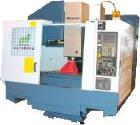|
Computer
numeric control (CNC) machines are probably one of the most
demanding applications for phase converters. Most often used in
metal fabrication, CNC machines use electronics to control the speed
and movement of multiple motors within the machine. When operating
at maximum productivity, the constantly changing load of CNC
machines results in a widely variable current demand from the
three-phase power supply.
Of the four
phase converter types -- static, rotary, digital and VFD – only
rotary and digital phase converters are suitable for the operation
of CNC machines. Operating a CNC machine with a static phase
converter or phase converting VFD will damage the machine.
Rotary Converters and CNC Machines
The widely
variable load of CNC machines exposes the primary weakness of rotary
phase converters, namely, the inability to main balanced voltage. A rotary
phase converter can provide balanced voltage at only one load point
and the more variable the load, the worse the voltage balance. If a CNC machine is operated on a rotary phase converter, the converter
must be oversized to minimize the voltage imbalance. Oversizing the
phase converter to improve voltage balance will result in poor
efficiency, often as low as 70%. It is also not advisable to
operate any other loads with the phase converter, as this will make
the load demand on the converter more variable.
|
In all likelihood, a CNC machine operated on a rotary
converter will have to be detuned to reduce the large spikes of
current that are needed when the spindle motor speed ramps up and
down very quickly. This detuning will make the CNC machine
less productive.
 The
large rotary converter needed to operate CNC machines will have a
very large inrush current when it is started and is likely to cause
line disturbances on the single-phase line. These line
disturbances are a severe voltage drop that affects other users on
the line. Most electric utilities will not allow
across-the-line starting of large motors on single-phase service and
may require a soft start device for these loads, which adds
significant expense to the installation. A large rotary
converter will also operate with a very poor power factor, consuming
large reactive currents on the line side. This current
requires the wires and breakers feeding the converter to be
oversized and leads to losses in efficiency. Even though your
meter may not charge for the reactive current, the utility must
generate this reactive power and may charge a power factor penalty. The
large rotary converter needed to operate CNC machines will have a
very large inrush current when it is started and is likely to cause
line disturbances on the single-phase line. These line
disturbances are a severe voltage drop that affects other users on
the line. Most electric utilities will not allow
across-the-line starting of large motors on single-phase service and
may require a soft start device for these loads, which adds
significant expense to the installation. A large rotary
converter will also operate with a very poor power factor, consuming
large reactive currents on the line side. This current
requires the wires and breakers feeding the converter to be
oversized and leads to losses in efficiency. Even though your
meter may not charge for the reactive current, the utility must
generate this reactive power and may charge a power factor penalty.
Digital Phase Converters and CNC Machines
Digital phase
converters are far superior to rotary converters for operating CNC
machines.
|
A true digital phase converter produces sine wave
voltage, making it safe to power the electronics in the machine.
It will maintain perfectly balanced voltage from no load to full load
and can supply very large momentary currents, allowing the CNC
machine to operate at maximum capacity. The converter does not have
to be oversized to operate CNC machines, and as a rule of thumb, can
be sized by matching the spindle HP of the CNC machine to the HP
rating of the converter.
A digital
converter has no moving parts, so there are no starting currents to
cause line disturbances. With electronic power factor correction,
it operates at unity power factor and does not consume reactive
power. In fact, it will supply the reactive power needed by any
loads it operates, making it a very utility friendly converter. The
converter operates at 95-98% efficiency and when energized with no
load consumes very little power.
A digital
phase converter can operate multiple CNC machines or any combination
of loads within its capacity. It supplies clean, balanced
three-phase power that is of higher quality than utility supplied
three-phase. The only true digital phase converter is manufactured
by
Phase Technologies.
Some companies are marketing phase converting VFDs as digital phase
converters, but these cannot safely operate anything other than
single inductive motor loads.
|
|